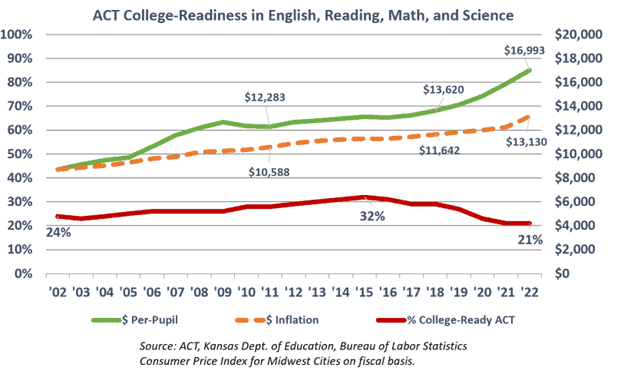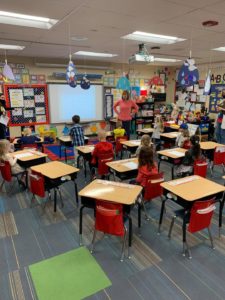Kansas Reflector gaslights readers on school funding, makes false accusations of legislators
(The Sentinel) – A recent story about school funding in the Kansas Reflector reminded me of a quote by Winston Churchill – a lie gets halfway around the world before the truth has a chance to get…

(The Sentinel) – A recent story about school funding in the Kansas Reflector reminded me of a quote by Winston Churchill – a lie gets halfway around the world before the truth has a chance to get its pants on.
A lie frequently repeated (by the Kansas City Star, Wichita Eagle, KNEA, and the Kansas Association of School Boards) gains the presumption of truth, but it is still a falsehood.
The Reflector used a magician’s deception to accuse Senate President Ty Masterson of falsely claiming that school funding wasn’t cut under Governor Brownback. The article represents a smallish piece of school funding – base state aid – as total funding without revealing that it is less than a quarter of total funding. It’s like a child going from having $3 in change to $4, but complaining about having fewer nickels.
Total funding per-student, according to the Kansas Department of Education, increased from $12,283 in FY 2011 (the school year in which Brownback took office) to $13,620 in FY 2018, the last school year before Governor Kelly took office. Per-student funding also increased faster than inflation during that period.

Further, KSDE records show that school districts increased their operating cash reserves (total less reserves for debt, capital outlay, and federal reserves) from $780 million to $928 million while Brownback was in office. Most of the increase represents state and local tax dollars that weren’t spent. Education officials and media can’t legitimately claim that funding was insufficient since districts weren’t spending everything they received.
The Kansas Reflector has access to this government-provided data, yet it persists in pushing a false narrative, and not just about total funding.
More deception on special education funding
The Kansas Reflector also consciously misrepresents special education funding in several ways.
First, it says the Kansas Association of School Boards estimates that the special education funding is about $160 million short of the statutory requirement. But then they say Governor Kelly is proposing to “add $72.4 million for special education every year for the next five years to meet the statutory requirement.” Kelly’s proposal compounds each year, putting the total 5-year cost at $1.1 billion, or about $900 million more than it would take to fully fund special education at the KASB estimate.
Reporters are notoriously bad at math, but even if they missed the compounding aspect, five times $72.4 million is more than double the alleged shortfall. Further, it seems to be a conscious effort to deceive because they regurgitate a Kelly press release that says her proposal puts Kansas “on track to fully fund special education.” To fully fund, according to KASB, would only cost $160 million. They know Kelly is torturing the truth, but they dutifully carry her water anyway.
Next, the article quotes school teacher Liz Meitl to refute House K-12 Budget Chair Kristey Williams, who (accurately) says that 149 school districts are getting more special ed funding than called for in state statute. Meitl accused Williams of “misrepresenting the situation,” but she didn’t provide her own numbers; instead, she gave an irrelevant word salad. For the record, Rep. Williams was accurately stating calculations in a publicly available spreadsheet provided by the Kansas Department of Education.
Finally, the reporter withholds pertinent facts from readers. A discussion in Williams’ committee revealed that the statutory formula to calculate special education funding is flawed, failing to include over $160 million in state-provided Local Option Budget funding for the 2022 school year related to special education. KSDE acknowledges that the formula counts some, but not all, LOB funding provided for special education, and it has no explanation for its exclusion.
It’s no wonder that trust in media is so low when Kansans are fed tall tales like the Kansas Reflector did this week.



